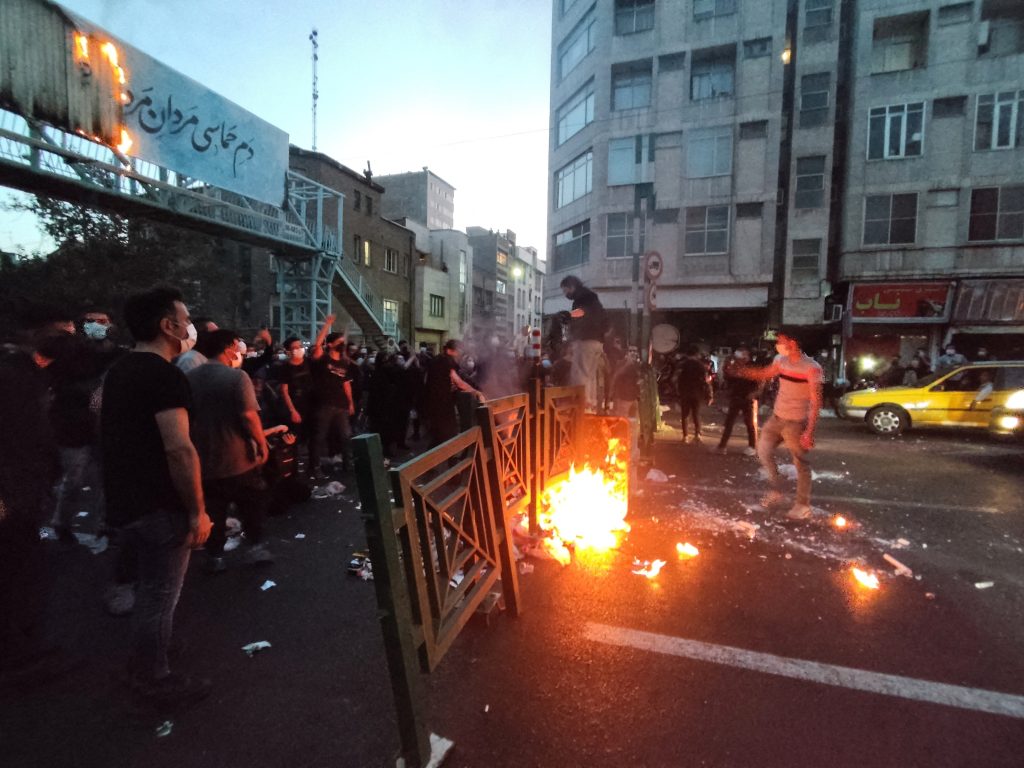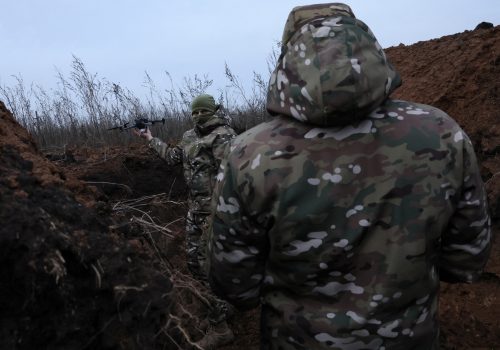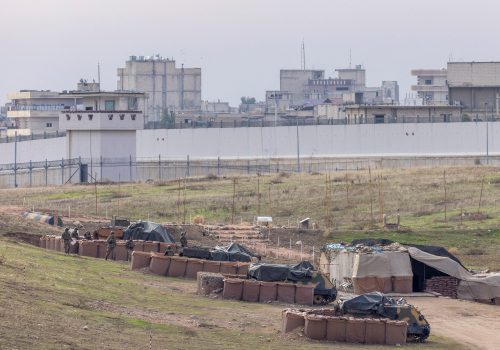This year has been a tough one for the world’s worst authoritarians: Russian President Vladimir Putin, Chinese leader Xi Jinping, and Iranian Supreme Leader Ayatollah Ali Khamenei. Each of them ends 2022 reeling from self-inflicted wounds, the consequences of the sorts of bad decisions that hubris-blinded autocrats find far easier to make than to unwind.
Given that, the United States and its global partners should double down in 2023 to shape the contest unfolding between democrats and despots that will define the post-Cold War order. US President Joe Biden has consistently focused on this competition as a historic “inflection point.” His third year in office provides him his best opportunity yet to score lasting gains in that contest.
At the beginning of this year, autocracy seemed to be on the march. Putin and Xi in early February 2022, just ahead of the Beijing Olympics, entered a “no limits” strategic partnership. That was followed by Putin’s invasion of Ukraine.
But since then, in all three cases—Russia, China, and Iran—autocratic leaders’ errors of commission have deepened their countries’ underlying weaknesses while breeding new difficulties that defy easy solutions.
That’s most dramatically the case with Putin, whose reckless, unprovoked, and illegal war in Ukraine has resulted in 6,490 civilian deaths, per the United Nations’s most recent estimate, and has prompted more than a million Russians to flee his country. International observers point to proof of crimes against humanity.
Beyond that, Putin has set back the Russian economy—some experts believe by as much as a decade—and sanctions are only beginning to bite. He’ll never regain his international reputation, and his military has revealed itself—despite many years of investments—as poorly trained, badly disciplined, and lacking morale.
Xi’s mistakes are less bloody in nature thus far. The excesses of his zero-COVID policy set off large-scale, spontaneous protests that amounted to the most serious challenge of his decade in leadership. Just last month, the Twentieth National Congress of the Chinese Communist Party anointed Xi with a third term as China’s leader, but the protests that followed shortly thereafter shattered that aura of invincibility and apparent public support.
“Xi is in a crisis of his own making, with no quick or painless route out,” wrote the Economist this week. “New COVID cases are near record levels. The disease has spread to more than 85 percent of China’s cities. Clamp down even harder to bring it back under control, and the economic costs will rise yet higher, further fueling public anger. Allow it to spread and hundreds of thousands of people will die… China’s leaders appear to be searching for a middle ground, but it is not clear there is any.”
Beyond COVID-19, what is in danger is the unwritten social contract between the Chinese Communist Party of just 96 million members and the total Chinese population of 1.4 billion. Namely, the Chinese people accept restricted freedoms and fealty to the party so long as the party provides economic rewards and social security. A series of policy mistakes has slowed Chinese growth to just 3 percent in 2022, yet Xi continues to prioritize party control over economic freedoms.
Though the global stakes of Iran’s protests are less obvious, the Mideast and world would be far better off with a more moderate and pluralistic Iran that focuses on its public needs, retreats from its regional adventurism, and steps back from the nuclear brink. Here, too, the regime’s problems have been self-created, the protests being a result of excessive regime brutality and endemic corruption.
So, what should be done in 2023 to transform these authoritarian setbacks into a more sustainable advance of the “free world” (helping to reverse a sixteen-year global decline of democracy, as measured by Freedom House’s 2022 report)?
First and most immediately, the United States and its partners should deepen and expand their military and financial support for Ukraine. The Biden administration’s top officials understand this is the defining battle of our post-Cold War era. Without US military and financial support, and without US rallying of allies, all of Kyiv’s remarkable courage and resilience might not be enough.
That said, Biden’s caution and his often-stated fears of setting off World War III have limited the sorts and amounts of armaments Ukraine receives—and the speed at which they reach the battlefield. Faster delivery of more and better air defense could have saved Ukrainian lives.
It’s remains difficult to understand continued limits put on Ukraine’s ability to strike the targets from which they are being hit as Putin murderously pummels more civilian targets and infrastructure.
NATO Secretary General Jens Stoltenberg has rightly accused Putin of weaponizing winter in the hope of freezing Ukraine’s citizens into submission. Perhaps the greater danger is that of Western fatigue in supporting Ukraine and growing external pressure on Kyiv to negotiate, when only further battlefield gains will prompt Putin to withdraw his troops and provide concessions that would allow a secure, sovereign, and democratic Ukraine to emerge.
Even as Russia requires action now, managing the Chinese challenge requires a more patient course, one that will be made easier should Putin be strategically defeated in Ukraine. Biden was right to meet with Xi in Bali, on the margins of the Group of Twenty meeting, to build a floor which can keep the world’s most crucial bilateral relationship from sinking.
Where the United States should step up its efforts in 2023 is in coalescing allies in Europe and Asia around a sustainable, consensus-driven approach to China that recognizes Beijing’s underlying weaknesses and deters its efforts to absorb Taiwan and remake the global order.
There are three potential outcomes at this “inflection point”: a reinvigoration and reinvention of our existing international liberal order, the emergence of a Chinese-led illiberal order, or the breakdown of world order altogether on the model of Putin’s “rule of the jungle.”
As 2022 ends, the failures and costs of those alternative models are clearer than ever.
Therefore, what’s crucial in the year ahead is for democracies to unify in common cause to shape the global future alongside moderate, modern non-democracies that seek a more secure, prosperous, and just world.
Frederick Kempe is president and chief executive officer of the Atlantic Council. You can follow him on Twitter @FredKempe.
This article originally appeared on CNBC.com.
THE WEEK’S TOP READS
#1 China’s failing COVID strategy leaves Xi with no good options
ECONOMIST
To understand Xi’s dilemma, read this smart Economist essay breaking down the consequences China will face if it abandons Xi’s “zero-COVID” policy—and the consequences it will face if it doesn’t.
One jarring image of Xi’s determination to go all-in on “zero-COVID” is an empty vaccine factory. “The stifling of debate,” the Economist writes, “has had baleful consequences. China has not approved the use of foreign vaccines, including the most effective ones, the mRNA jabs made by Pfizer-BioNTech and Moderna.”
What experience shows is “the protection accorded by Chinese shots appears to wane significantly after six months. Worse, the authorities have focused on testing and building quarantine sites this year, while failing to administer third (or even fourth) doses to all, even though these would require no new infrastructure or political messaging.” Read More →
#2 Enough about democracy’s weaknesses. Let’s talk about its strengths.
Fareed Zakaria | WASHINGTON POST
CNN’s Fareed Zakaria, one of the premier strategic thinkers out there, has written a compelling defense of democracy’s virtues in the face of authoritarianism’s setbacks.
“It is astonishing to remember that when America’s Founding Fathers were constructing their experiment in government,” Zakaria writes, “they were virtually alone in a world of monarchies. These politicians were drawing on the writings of Enlightenment intellectuals such as Montesquieu and John Locke, studying historical examples from ancient Greece and Rome, and embracing key elements of English governance and common law. But they were mostly making it up in their heads. They had failures; their first effort, the Articles of Confederation, collapsed. In the end, however, they concocted something stunning: a system that protected individual rights, allowed for regular changes in leadership, prevented religious hegemony, and created a structure flexible enough to adapt to massive changes.” Read More →
#3 Kevin Rudd on Jiang Zemin, steward of China’s rise
Kevin Rudd | INTERPRETER
Former Australian Prime Minister Kevin Rudd, one of the keenest observers of China anywhere, has delivered a brilliant obituary on former Chinese leader Jiang Zemin that provides insight into China’s reformist past and puts in perspective its unfortunate return to Marxism-Leninism under Xi.
His narrative recalls his own experience of Jiang, then mayor of Shanghai, singing O Sole Mio at the Sydney Opera House in 1987. It then tracks how this larger-than-life individual navigated the shoals of Communist Party politics to usher in China’s era of rapid economic growth and private sector expansion.
“Jiang’s death this week at 96,” writes Rudd in the Lowy Institute’s Interpreter, “marks the final, flickering embers of that now-distant reformist age—and the unambiguous beginning of the brave, new world of Xi Jinping.” Read More →
#4 The Russian Billionaire Selling Putin’s War to the Public
Betsy McKay, Thomas Grove, and Rob Barry | WALL STREET JOURNAL
This WSJ investigation is a powerfully reported exposé of Yuri Kovalchuk, also known as “Putin’s banker,” an oligarch and media baron, who has used his banking and media empires to promote Putin’s murderous war in Ukraine.
“A physicist by training,” three WSJ reporters write, “Kovalchuk is motivated more by patriotic ideology than by the trappings of wealth, say people who know him. He doesn’t hold a formal position in the Russian government. Yet he has deep influence over Kremlin policy and personnel, and helps supply dachas and yachts for Putin’s use, and lucrative jobs and stockholdings to the president’s family and friends, according to people familiar with the deals, financial documents and anticorruption groups.”
“Kovalchuk,” the WSJ adds, “controls the US-sanctioned Russian Bank Rossiya. The bank, in turn, built a network of offshore companies that have benefited Putin and his associates, and invests in projects important to the state, according to interviews with former US officials and Kremlin analysts as well as public documents and information revealed in the Panama Papers, a trove of leaked documents detailing offshore financial holdings.” Read More →
#5 Rise in Iranian assassination, kidnapping plots alarms Western officials
Shane Harris, Souad Mekhennet, and Yeganeh Torbati | WASHINGTON POST
This week’s must-read is chilling. In a remarkable narrative, the Washington Post pieces together a large-scale Iranian campaign of kidnapping, intimidation, and assassination against critics and opponents, which has escalated in recent years.
One heartbreaking case is that of the Iranian journalist Ruhollah Zam, who was lured to Iraq where he was arrested and turned over to Iranian authorities. “The IRGC,” the Post writes, referring to Iran’s Islamic Revolutionary Guard Corps, “publicly boasted of its own deception, portraying Zam’s capture as a triumph for the Iranian security services, which had outfoxed their Western adversaries. Zam was tried and sentenced to death for ‘corruption on Earth.’ He was hanged on Dec. 12, 2020, at the age of 42.”
“Another chilling example is of a failed Iranian plot to kidnap Masih Alinejad, an American citizen. “The plan to kidnap Alinejad from her home in Brooklyn is illustrative of a global effort to intimidate exiled Iranians by showing they aren’t safe anywhere outside Iran,” the Washington Post authors write. “Last year, the Justice Department indicted four alleged Iranian intelligence officials and agents in the plot, saying they targeted Alinejad because she was ‘mobilizing public opinion in Iran and around the world to bring about changes to the regime’s laws and practices.
“The operatives allegedly hired private investigators to photograph and take video recordings of Alinejad and her family and researched how they might use speedboats to secret her out of New York and eventually on to Venezuela, ‘a country whose de facto government has friendly relations with Iran,’ the Justice Department said in a statement.” Read More →
Atlantic Council top reads
Image: FILE PHOTO: People light a fire during a protest over the death of Mahsa Amini, a woman who died after being arrested by the Islamic republic's "morality police", in Tehran, Iran September 21, 2022. WANA (West Asia News Agency) via REUTERS



